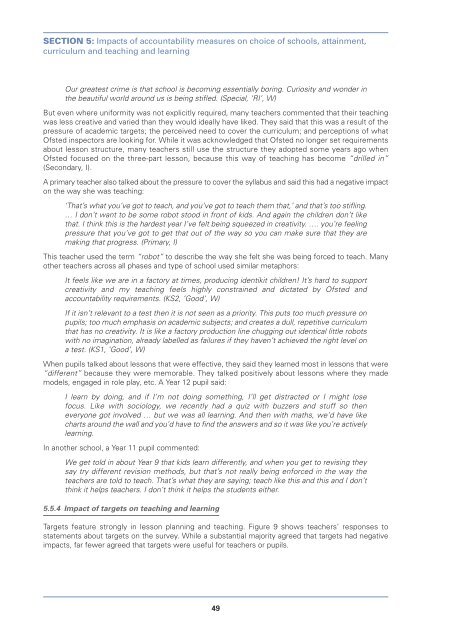exam-factories
exam-factories
exam-factories
Create successful ePaper yourself
Turn your PDF publications into a flip-book with our unique Google optimized e-Paper software.
SECTION 5: Impacts of accountability measures on choice of schools, attainment,curriculum and teaching and learningOur greatest crime is that school is becoming essentially boring. Curiosity and wonder inthe beautiful world around us is being stifled. (Special, ‘RI’, W)But even where uniformity was not explicitly required, many teachers commented that their teachingwas less creative and varied than they would ideally have liked. They said that this was a result of thepressure of academic targets; the perceived need to cover the curriculum; and perceptions of whatOfsted inspectors are looking for. While it was acknowledged that Ofsted no longer set requirementsabout lesson structure, many teachers still use the structure they adopted some years ago whenOfsted focused on the three-part lesson, because this way of teaching has become “drilled in”(Secondary, I).A primary teacher also talked about the pressure to cover the syllabus and said this had a negative impacton the way she was teaching:‘That’s what you’ve got to teach, and you’ve got to teach them that,’ and that’s too stifling.… I don’t want to be some robot stood in front of kids. And again the children don’t likethat. I think this is the hardest year I’ve felt being squeezed in creativity. …. you’re feelingpressure that you’ve got to get that out of the way so you can make sure that they aremaking that progress. (Primary, I)This teacher used the term “robot” to describe the way she felt she was being forced to teach. Manyother teachers across all phases and type of school used similar metaphors:It feels like we are in a factory at times, producing identikit children! It’s hard to supportcreativity and my teaching feels highly constrained and dictated by Ofsted andaccountability requirements. (KS2, ‘Good’, W)If it isn’t relevant to a test then it is not seen as a priority. This puts too much pressure onpupils; too much emphasis on academic subjects; and creates a dull, repetitive curriculumthat has no creativity. It is like a factory production line chugging out identical little robotswith no imagination, already labelled as failures if they haven’t achieved the right level ona test. (KS1, ‘Good’, W)When pupils talked about lessons that were effective, they said they learned most in lessons that were“different” because they were memorable. They talked positively about lessons where they mademodels, engaged in role play, etc. A Year 12 pupil said:I learn by doing, and if I’m not doing something, I’ll get distracted or I might losefocus. Like with sociology, we recently had a quiz with buzzers and stuff so theneveryone got involved … but we was all learning. And then with maths, we’d have likecharts around the wall and you’d have to find the answers and so it was like you’re activelylearning.In another school, a Year 11 pupil commented:We get told in about Year 9 that kids learn differently, and when you get to revising theysay try different revision methods, but that’s not really being enforced in the way theteachers are told to teach. That’s what they are saying; teach like this and this and I don’tthink it helps teachers. I don’t think it helps the students either.5.5.4 Impact of targets on teaching and learningTargets feature strongly in lesson planning and teaching. Figure 9 shows teachers’ responses tostatements about targets on the survey. While a substantial majority agreed that targets had negativeimpacts, far fewer agreed that targets were useful for teachers or pupils.49


